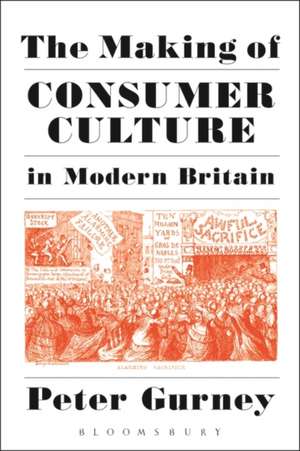The Making of Consumer Culture in Modern Britain
Autor Peter Gurneyen Limba Engleză Hardback – 17 mai 2017
| Toate formatele și edițiile | Preț | Express |
|---|---|---|
| Paperback (1) | 231.89 lei 43-57 zile | |
| Bloomsbury Publishing – 29 mai 2019 | 231.89 lei 43-57 zile | |
| Hardback (1) | 774.62 lei 43-57 zile | |
| Bloomsbury Publishing – 17 mai 2017 | 774.62 lei 43-57 zile |
Preț: 774.62 lei
Preț vechi: 1113.40 lei
-30% Nou
Puncte Express: 1162
Preț estimativ în valută:
148.25€ • 154.36$ • 125.29£
148.25€ • 154.36$ • 125.29£
Carte tipărită la comandă
Livrare economică 10-24 martie
Preluare comenzi: 021 569.72.76
Specificații
ISBN-13: 9781441137210
ISBN-10: 1441137211
Pagini: 288
Ilustrații: 16 bw illus
Dimensiuni: 156 x 234 x 21 mm
Greutate: 0.57 kg
Editura: Bloomsbury Publishing
Colecția Bloomsbury Academic
Locul publicării:London, United Kingdom
ISBN-10: 1441137211
Pagini: 288
Ilustrații: 16 bw illus
Dimensiuni: 156 x 234 x 21 mm
Greutate: 0.57 kg
Editura: Bloomsbury Publishing
Colecția Bloomsbury Academic
Locul publicării:London, United Kingdom
Caracteristici
Student and lecturer-friendly, with primary sources and ideas for discussion
Notă biografică
Peter Gurney is Professor of British Social History at the University of Essex, UK.
Cuprins
List of IllustrationsList of Abbreviations1. Historicising Consumer Culture Part One: A New World of Goods: 1800-1870 Preface 2. Producing Consumers: Consumption Practices 3. Alternative Paths: The Politics of Consumption Part Two: Making a Mass Market: 1870-1920 Preface 4. Image Worlds: The Rise of Modern Advertising 5. Shopping as Pleasure: Department Stores 6. Co-op Commonwealth: Consumer Organising Part Three: A Consumers' Democracy: 1920-2000 Preface 7. Ideal Home: The Growth of the New Consumerism 8. Mass Consumerism: From Austerity to Affluence 9. Consumer Culture: The Hegemony of Choice Epilogue: Satisfaction Guaranteed? Sources Select bibliography
Recenzii
The book provides important insights into class and gender as it pertains to politics and consumption, and highlights the dueling sense of satisfaction and anxiety that has characterized modern consumer culture. The well-paced analysis likewise traces the evolution of consumption-related practices such as advertising and the experience of shopping. The agency of consumers themselves is covered as well; Gurney's treatment of the history of cooperative ventures is particularly instructive in this regard ... Summing Up: Highly recommended. Upper-division undergraduates and above.
Consumer society in Britain has found its historian! In a clear yet challenging account, Peter Gurney has produced a comprehensive study of consumption in all its manifestations. He has done so by emphasising the important power dynamics that have shaped our role as consumers and the economy and society within which we live. Both new students and established scholars will find much to grapple with in these pages.
Gurney's book is essential reading for anyone interested in consumption, commodities and how they have all shaped modern Britain. And who can afford not to be interested in that? Gurney is both a keen and enthusiastic shopper and well aware of the ethical, moral and critical dimensions to these debates. Ranging across the 19th and 20th centuries and through luxury and poverty, there is something for all here. Much like a good shop, an historian's emporium, one might say!
A pleasurable but powerful study that demonstrates how retailing and shopping fashioned the history of modern Britain. With a great eye for key turning points and telling examples, Gurney has given us a sweeping overview of more than three decades of scholarship on the consumer culture, commercial practices, and politics of consumption in the nation of shopkeepers since the eighteenth century.
Consumer society in Britain has found its historian! In a clear yet challenging account, Peter Gurney has produced a comprehensive study of consumption in all its manifestations. He has done so by emphasising the important power dynamics that have shaped our role as consumers and the economy and society within which we live. Both new students and established scholars will find much to grapple with in these pages.
Gurney's book is essential reading for anyone interested in consumption, commodities and how they have all shaped modern Britain. And who can afford not to be interested in that? Gurney is both a keen and enthusiastic shopper and well aware of the ethical, moral and critical dimensions to these debates. Ranging across the 19th and 20th centuries and through luxury and poverty, there is something for all here. Much like a good shop, an historian's emporium, one might say!
A pleasurable but powerful study that demonstrates how retailing and shopping fashioned the history of modern Britain. With a great eye for key turning points and telling examples, Gurney has given us a sweeping overview of more than three decades of scholarship on the consumer culture, commercial practices, and politics of consumption in the nation of shopkeepers since the eighteenth century.
